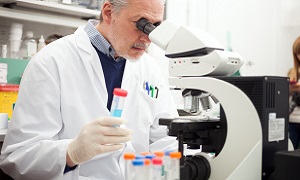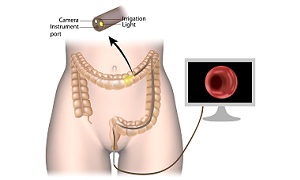What is Colorectal Cancer?
Colorectal cancer is the cancer of colon & rectum.
Colorectal cancer occurs when the cells lining the colon & rectum grow out of control. These cells create tumour, which is known as cancer (metastatic tumour).
What are the symptoms of Colorectal Cancer?
Colorectal cancer generally does not show any symptoms in the early stages.
Common symptoms of colorectal cancer are:
- Constipation or diarrhoea
- Bleeding or cramping in the rectum
- Dark patches of blood in or on the stool
- Discomfort or bloating in the belly
- Fatigue & loss of appetite
- Pelvic pain
Risk factors & causes of Colorectal Cancer
- Age – The chance of getting colorectal cancer increases with age.
- Gender – Men are more likely to develop colorectal cancer.
- Polyps – These growths are present on the inner wall of colon or rectum which are precancerous. Adenoma is a type of polyp which causes colorectal cancer more likely.
- Personal history – If a patient already had colorectal cancer, there is a chance of relapse before age 60.
- Family – Having family history of colorectal cancer.
- Diet – Certain types of diets which contain a lot of fat and cholesterol and little fibre may lead to colorectal cancer.
- Lifestyle – Smoking, alcohol intake & overweight can lead to colorectal cancer.
- Diabetes – People with diabetes are more likely to develop colorectal cancer.
Diagnosis of Colorectal Cancer
Complete Blood Test (CBC)
Liver Enzymes test
Tumour markers test
MSI & MMR test
CT Scan
Abdominal Ultrasound
Endorectal MRI
PET CT Scan
In case of specific situations your doctor may recommend PET CT Scan.
Diagnostic colonoscopy
Proctoscopy
Biopsy
Treatment options for Colorectal Cancer
Following are the common treatment options for colorectal cancers.
Surgery
Chemo
Chemo is the use of anti-cancer drug that helps to slow or stop the growth of rapidly dividing cells that cause cancer. It prevents the growth of rapidly dividing cells by killing the dividing cells.
Despite its side effects, chemo is still the most widely used cancer treatment option. Unlike radiation and surgery which treats cancer cells at particular locations, chemo drugs can kill cancer cells that have metastated (spread) to different organs in the body.
Radiation Treatment

Radiation Treatment is a kind of cancer treatment that uses high doses of radiation beams to kill cancer cells to shrink the tumors. Radiation kills the cancer cells by destroying the DNA. Cancer cells with damaged DNA fail to multiply and die. They are then removed by the body’s mechanism.
Targeted Drug Treatment

Targeted treatment is a type of cancer treatment that uses cancer drugs. However, it is different from traditional chemo, which also uses drugs to kill cancer cells. In Targeted treatment, the cancer’s specific genes, proteins, or the tissue environment that contributes to cancer growth and survival are targeted. Targeted treatment is generally used with chemo and other interventions.
Immuno Treatment
Immuno Treatment (also called biological treatment) is a new type of cancer treatment where the body’s immune system is boosted to help the body fight cancer by itself. Immuno treatment uses substances made by the body or in a laboratory to improve or restore immune system function.









